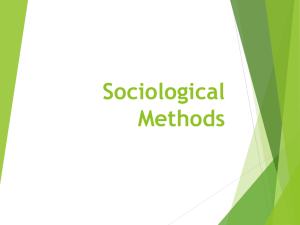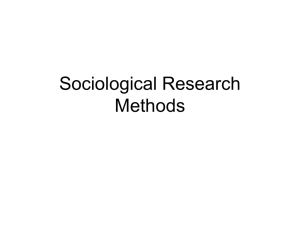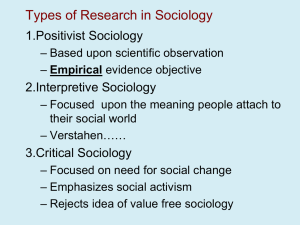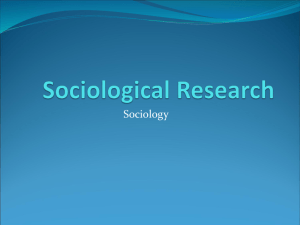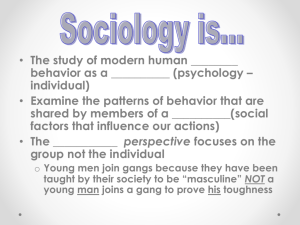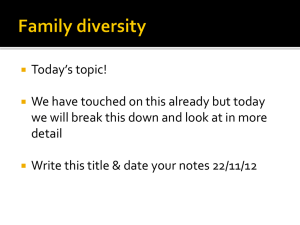Chapter Two - Cameron University
advertisement
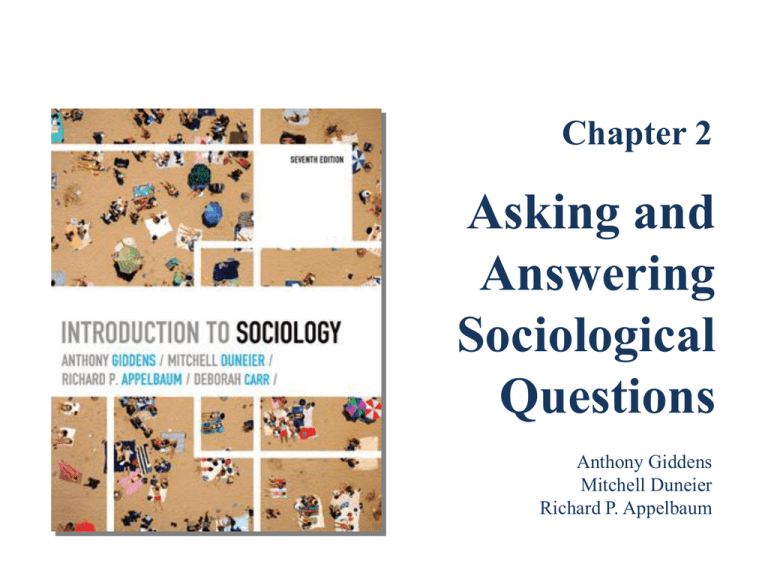
Chapter 2 Asking and Answering Sociological Questions Anthony Giddens Mitchell Duneier Richard P. Appelbaum Sociological Questions Four Types of Questions Sociologists Ask – Factual (empirical)—collecting data – Comparative—relating one social context to another, within a society or between different societies – Developmental—comparing societies’ past and present – Theoretical—interpreting what facts mean The Research Process The Research Process – The seven steps of the research process are: • • • • • • • Defining the research problem Reviewing the evidence Making the problem precise Working out a design Carrying out the research Interpreting the results Reporting the findings Understanding Cause and Effect Causation and Correlation – Causation cannot be directly inferred from correlation • Causation: one event or situation produces another • Correlation: regular relationship existing between two variables Understanding Cause and Effect Causation and Correlation (cont) – When assessing the cause that explains a correlation we use: • Independent variable Produces an effect on another variable • Dependent variable The variable affected • Control Variables held constant in order to look at effects of others Research Methods Ethnography – Ethnography is the study of people firsthand • Using participation observation or interviewing • Investigator spends time living or working with community – Advantages • Provides detailed information about group – Disadvantages • Only works with small groups • Researcher must gain trust of group • Researcher could lose perspective Research Methods Surveys – Surveys are questionnaires given to selected group of people – Sampling concentrates on a small proportion of overall group – Advantages • Answers are easily quantified • Large groups can be studied • Researchers can employ agency to collect responses – Disadvantages • Findings might be superficial or doubtful • Levels of nonresponse are high Research Methods Experiments – Testing hypothesis under controlled conditions – Advantages • Easily controlled and repeated – Disadvantages • Only small groups can be tested • People might behave unnaturally Research Methods Other Research Methods – Life histories • Assembling biographical material about individuals – Comparative research • Comparing various groups in different societies – Historical analysis • Studying past events directly through interviewing or written record Research in the Real World Other Research Methods (cont) – Triangulation • Because all research methods have limitations, researchers often combine several research methods in order to check and supplement material obtained from the others Research in the Real World Human Subjects and Ethical Problems – All research involving humans can pose ethical dilemmas – Sociologists must ask: • Does research pose risks to the subjects that are greater than risks they face in daily lives? – Federal government has gotten stricter with universities about how they treat research subjects • Universities now review all research Research in the Real World Influence of Sociology – Sociologists not only study society, they shape society – Sociological research is filtered down – Sociological knowledge affects behavior Review Questions 1. Which of the following are types of questions that sociologists often use in their research? a) functional questions b) structural questions c) developmental questions d) All of the above Review Questions 2. Which of the following are the standard sequential steps in the research process? a) ask empirical questions; define research problem; test hypotheses; interpret results b) review evidence; select a research design; interpret results; report findings c) find a previously unexplored research problem; conduct a survey or experiment; collect data; report findings d) select a topic; ask factual, comparative, and theoretical questions; anticipate problems; interpret results Review Questions 3. In a causal relationship, the ________ variable is the variable that produces an effect on another variable. a) dependent b) independent c) control d) functional Review Questions 4. Which of the following scenarios do you think poses the greatest ethical dilemma for a researcher? a) Conducting face-to-face interviews with subjects (who know they are participating in a study) without telling them you are the director of the research project. b) Asking subjects to complete a survey on a computer about eating habits when the real focus of the study is how people react when faced with computer hardware or software problems. c) Joining an organization or informal social group in order to do ethnographic research without telling the members of the organization or group the real purpose of your participation. d) Examining data from another researcher’s project and coming up with different conclusions. Review Questions 5. What is a limitation of surveys that use standardized questions? a) Such surveys can only be used with a small sample of people b) It is difficult to draw conclusions about a broader population based on survey responses. c) The responses will not be in-depth or reveal much subtlety of opinion. d) Responses can be difficult to compare statistically. Review Questions 6. ________ is the study and systematic description of human cultures through participant observation or interviewing. a) Ethnology b) Anthropology c) Comparative research d) Ethnography Review Questions 7. Which of the following statements best describes the relationship between sociological research and human behavior? a) There is a constant feedback loop between sociological research and human behavior; one informs the other. b) People participating in research studies may not always be completely honest or natural in their responses or behavior because they may be trying to give a “correct” answer or behave as they think the researcher wants them to. c) Everyday human behavior is not much influenced by the findings of academic research studies. d) Cutting-edge sociological research depends upon the emergence of increasingly extreme forms of human behavior.

